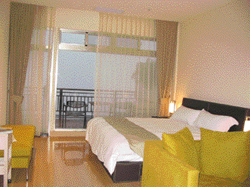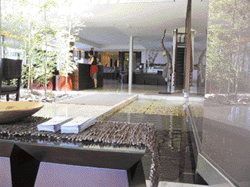News
A work of art, Clouds Hometown hotel treasures light and space
2005-09-18 / Taiwan News, Contributing Writer / By Luke Sabatier
 |
| This medium-priced room at the Clouds Hometown hotel is bright and airy./photo by Luke sabatier, taiwan news |
Chingjing Farm likes to portray itself as a European getaway, and most of its more than 100 inns are wooden chalets to conjure up an Alpine setting.
But the best place to stay, without a doubt, is literally a work of art. Opened last December, Clouds Hometown , the somewhat awkward English name given to (雲的故鄉), was designed by prominent sculptor Ju Ming, and is decorated with works by his son Ju Jun.
Anybody who has been to the Ju Ming Museum in Jinshan just off of Taiwan's northern coast will immediately recognize the unique style of the works of art exhibited in the lobby and upper floor corridors. A small rock with a zipper running through it displayed on the second floor, for example, unmistakably mimics a massive outdoor sculpture at the Jinshan museum.
None of Ju Ming's individual works are on display, the hotel itself standing as his masterpiece. The soul of his creation is an exquisite lobby, which elegantly brings together glass, wood, stone and water. As you walk toward the front desk, you pass bamboo trees that sky toward a glass ceiling, an essential part of Ju Ming's overall concept to blend the hotel with nature and create a relaxing atmosphere.
 |
| The glass and stone lobby of the Clouds Hometown hotel is decorated with tall green bamboo plants./photos by Luke sabatier, taiwan news |
"He wanted this building to breathe, so he left two points on the ground floor where the ceiling was open to the sky and sunlight could shine in," says Clouds Hometown manager Tracy Lin.
Adding to the sense of space are the French windows that line one full side of the lobby and open to a magnificent panorama.
"When people entered the hotel, Ju Ming didn't want there to be a closed-in feeling. He designed the French windows the full length of the lobby so that when people come in, they don't feel like they have to go outside to see the mountains," Lin explains.
The rooms, which were not designed by Ju Ming, nonetheless honor the overall design concept seen in the public areas that stresses earthen, soft colors and open spaces, a marked contrast with other inns in the area. Bathrooms looking over the mountains also have French windows and four of the hotel's 25 rooms have sky windows.
"Some people when they walk in actually feel it's a little empty," Lin says. "The European style chalets in the area have richer layouts with most of the space filled with various objects.
"We're really simple and give people a lot of space."
Of course, even the best places have their quirks. When you enter the hotel's lobby, you immediately see three low-standing stools elegantly embellished with hotel brochures and a bowl of water containing flower petals. The stools sit in front of a floor-level pool of water decorated with small stones.
"So what did Ju Ming want the stools to symbolize?" I ask.
"They're there to keep guests from falling into the water pool," Lin says somewhat sheepishly. "A few guests didn't pay attention and fell into the pool when they walked into the lobby."
The hotel's owner, a Taichung businessman, originally bought the land to build a simple hangout where he could entertain his friends. But that idea died the moment he revealed his idea to his friend Ju Ming, who has a workshop in the Chingjing area.
"Ju Ming was afraid the place his friend was going to build would be real ugly, so he agreed to design the hotel for him and suggested to the owner that it should be open to the public," Lin explains.
Ju Ming's vision resulted in an NT$100 million work of art that sits on a small cliff above the mountain road. You wonder if it could be vulnerable to landslides.
"From the time we've built the hotel to now, we've had three earthquakes and six typhoons without any problems. The foundation underneath consists of steel beams banged deep into the ground" Lin says.
The longer-term issue for Clouds Hometown, and one that all inns in the area face, is the National Land Preservation Act, which will only allow legally licensed facilities that contribute to eco-tourism to exist five to 10 years down the road.
Clouds Hometown has yet to get its license but Lin says the hotel was built in accordance with the government's building code and could begin operating because the formal application had been submitted.
One key regulation they and other hotel owners must meet is that for every "ping" of land used for the hotel, there needs to be three to four pings of land that is forested to prevent landslides. Most hotels we saw are so tightly packed into their plots of land, it's hard to see how they'll comply, but Clouds Hometown has a large hillside as part of its acreage that Lin says is being planted to meet the requirement.
While Lin and the owner may be fret about the future, the resort itself is ultimately about relaxation. Visitors should enjoy their environment, Lin says, rather than trying to hit all the sites in Chingjing Farm or the surrounding areas.
"It's a great place to get rid of the pressures of everyday life and free your spirit. You really don't want to have a packed itinerary of places to see. Just enjoy the environment and the scenery and relax."
